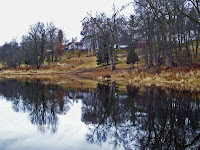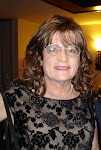 You may wonder where the falls are. Niagara has falls. Where is International Fall? And here it is around 1900, not a fall really, but a rapid in Rainy River called Koochiching Falls. Natives and fur traders had to portage their canoes around it.
You may wonder where the falls are. Niagara has falls. Where is International Fall? And here it is around 1900, not a fall really, but a rapid in Rainy River called Koochiching Falls. Natives and fur traders had to portage their canoes around it.That was before Edward Backus (1861-1934) came here from Minneapolis when there was not even a railroad. International Falls did not exist as a town, and what we call the Boundary Waters area was mostly wilderness. Traveling to the trading post here took him five days on a circuitous mix of rail, river and lake. He saw an abundance of timber for logs and visioned in these cascading waters a dam to power lumber and paper mills. To Backus, these developments would be art, poetry and money.
 In 1905-1909, he built the hydroelectric dam at Koochiching Falls (seen in this photo taken from the Canada side) water gushing forth from its turbines that powered his paper and lumber mills. In the 1920s he proposed seven more dams in the area, but these were successfully opposed by environmentalists, notably Ernest Oberholtzer. Backus lost all his money in stock market crash of 1929 and died a few years later. The paper mill now owned by Boise Cascade, along with its Canadian twin, still use power generated at the dam.
In 1905-1909, he built the hydroelectric dam at Koochiching Falls (seen in this photo taken from the Canada side) water gushing forth from its turbines that powered his paper and lumber mills. In the 1920s he proposed seven more dams in the area, but these were successfully opposed by environmentalists, notably Ernest Oberholtzer. Backus lost all his money in stock market crash of 1929 and died a few years later. The paper mill now owned by Boise Cascade, along with its Canadian twin, still use power generated at the dam.
 I walked across the bridge into Canada this morning and then southwest along the river to have a look at the US from there. In particular, I wanted to see the Boise Cascade mill which is so big, possibly the world’s biggest, that it can’t be seen well from the US side. And I wanted to see the dam that Backus built and the thing Ober (Oberholtzer) so bitterly opposed. -- http://www.eober.org/Oberholtzer/Oberholtzer.shtml
I walked across the bridge into Canada this morning and then southwest along the river to have a look at the US from there. In particular, I wanted to see the Boise Cascade mill which is so big, possibly the world’s biggest, that it can’t be seen well from the US side. And I wanted to see the dam that Backus built and the thing Ober (Oberholtzer) so bitterly opposed. -- http://www.eober.org/Oberholtzer/Oberholtzer.shtmlIn 1917, Ober writes, “I have lived almost continuously among the . . . Ojibwe Indians [near] Rainy Lake. I have made numerous trips alone on snowshoe or in canoe to tribes within a radius of 250 miles, one of the objects being to record their . . .language, . . . legends and songs. I have taken down a great many of their stories.”

 Tomorrow is Thanksgiving Day and one restaurant in International Falls will be open. I hope to take down some stories from the natives there, those who, for whatever reasons, are not with their families.
Tomorrow is Thanksgiving Day and one restaurant in International Falls will be open. I hope to take down some stories from the natives there, those who, for whatever reasons, are not with their families.Here are two pictures of Rainy River below the dam on the Canadian side.

Ahhh of course... the Falls! I was just believing in them without question! And "International", their being on the border. I love the quote from Ober, I find him a really fascinating character. I will read more about him. I am glad there is one restaurant open! I hope it is an interesting time there. I agree that Boise Cascade mill is enormous... I can see why it almost does not fit into a picture... The two last pictures are magnificent. I love both of them. Very inspiring... I think you must be on the verge of poems... even without snow Rainy River and Rainly Lake are enchanting.
ReplyDeleteAnyone who is walking near places called Rainy River and coo coo ka Koochiching Falls HAS to be on the brink of a poem. Loved today's entry Sharon, quite edible...gobble gobble. Please do enjoy your turkey delight tomorrow. I'll be on the road to Phoenix (by the time I get to Phoenix you'll be risinnnn)
ReplyDeleteSee you in the cloud layers :)
Lois
p.s. I love the photos too especially the last two!
ReplyDeleteI appreciate the confidence you both share—that I am on “the brink of a poem” (Lois) or “the verge of poems” (Kathabela). And what sort of brink or verge is this, I ask? —the edge of despair where I decide the winter I wanted is not coming, and the verge of foolishness where misadventure grips as it did those tears ago when Tennessee ceased to be wonderful? My life is always a brink, it seems—the edge of sweet. What sweet thing is beyond this verge? The poem is me, not words, it is expecting, lingering and hoping.
ReplyDeleteReally, I appreciate your comments and wish more would.
Your poetry is your writing which is beautiful.
ReplyDeleteThank you, Michael, it’s a pleasure following you through the blog, picking up little notes as you pass.
ReplyDelete